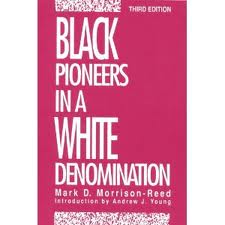The Need for Balance
I just finished reading, "Black Pioneers in a White Denomination," by Mark Morrison-Reed. It's one of the books that people preparing to see the Ministerial Fellowship Committee must read. I'm glad.
This book has a number of messages.
One of the slightly off topic but important messages that Rev. Morrison-Reed is getting across is that dedication to a
cause beyond everything else can be a mistake. Elthelred Brown nearly lost
everything in his dedication to the Unitarian cause. He was unable to leave the
church when it was time, and it died with him. His family was nearly destroyed
in this journey; whereas Lewis McGee had more of a balance, not devoting his
entire life to the cause of the spread of Unitarianism to the black community.
Now there are other, important realities to be considered here. Brown came a
bit earlier than McGee. Not much but enough that he had to face much harder obstacles
and racism of individuals within the AUA (American Unitarian Association).

At the same time Brown’s dedication
to the cause is admirable and something I have to watch within myself. I have
the power to devote myself to a cause above all else. There must be balance. A
cause that dies with you, that does not live on without your influence is
incomplete. It’s the same lesson about why, as a minister, self care is so very
important. If I am preaching, and believing that there must be balance between
the mind, body and spirit in my life I must also show that truth. You can tell
people any number of things about “Truth” but if you are just telling them it
is not going to matter in the same way as showing them. I owe it to my
congregation but I also owe it to myself. A life devoted without balance is a
suffering life (also the lesson of Brown).
I can’t help but imagine what he
would have been able to do with the support of the AUA. And indeed what the UUA (Unitarian Universalist Association)
would look like today if we had not been trapped within ignorance, racism and a
sort of liberal patronizing. If when approached by Rev. Mr. Jackson of Bedford
who told of his conversion to Unitarianism and asked for financial support for
his church, we had jumped at the chance and supported him. I can’t help but
wonder. Yet it is useless to wonder. It is the past and what we have to look to
is the future.
The need as a minister, to be
invested in your own self care is so present, and is sometimes neglected. It
can be easy to get caught up in sermon writing, in various crises and in
thinking about the congregation that you can forget the importance of caring
for yourself. We talked about that all the time in seminary… self care… self
care… self care…
Finding a place of grounding, a
place where you are at your center and you love yourself as much as you love
your congregation is essential to being a minister. And for some of us it is
one of the hardest things to accomplish. I know I still struggle with it
sometimes. Does it make it any better that I put self care on the list of
required activities for preparing to see the Ministerial Fellowship Committee?
It has to be as important as reading the book, because balance, self care, and
spiritual practices are as important to ministry as reading the books, although
annoyingly less tangible.
I can see myself in Rev. Brown’s
struggle. In Babylon 5 there is a point in one of the sort of side movies where
G’Kar (an alien sort of semi-religious figure) is reflecting on the Ranger’s (a
sort of semi-military, religious, spy group) who has a motto – “We Live for the
One. We Die for the One.” A Ranger is being punished for not following the
enemy and thus dying for the one. G’Kar points out that they are focusing on
the second half of that motto. How often do we do that? Believe that we must
suffer, we must die for our cause. What about the first half? I choose to live
for this faith. I choose to live for my congregation and my ministry. And I
choose to live a life of balance and love. Of course there will be suffering.
McGee’s life was not easy because he maintained greater balance, he still suffered.
And Brown’s life was not hard because he was devoted, he found joy within his
world. He found something in this faith that was worth his entire life,
something he didn’t give up on in the face of racism from the very governing
body of the faith to which he was called. Both lives are a powerful message.

No comments:
Post a Comment